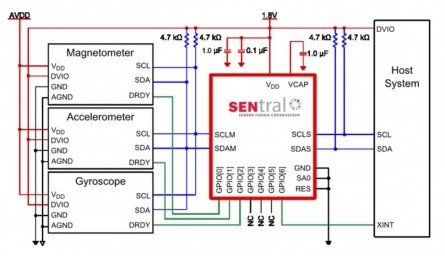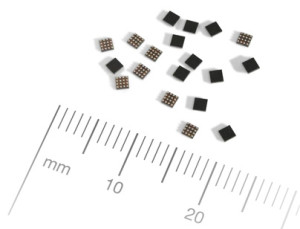Satnav for the pedestrian: low power, super accuracy
January 27, 2016
on
on

These days it’s not uncommon for car owners to be more skilled at tweaking their satnav system than actually driving the vehicle. While bikers and truckers are now also well served with great navigation systems, the humble pedestrian seems to have been forgotten. After all, what’s so difficult about finding a restaurant in NY if you are … ermm.., on foot?
PNI Sensor’s SENtrace is the first coprocessor for wearables providing accurate and ultra-low power pedestrian tracking indoors, as well as in urban “canyons” meaning near tall buildings and especially in large cities – or anywhere really where the global positioning systems (GPS) signal goes missing or is inadequate.
SENtrace enables existing ultra-low power inertial sensors to track users when there is little or no GPS signal available. It also greatly reduces overall battery consumption because it overrides and deactivates power-hungry GPS when it’s not needed. In typical configurations, the IC uses about one-tenth the power of GPS for computing each location point.

The chip provides tracking to one-meter accuracy over 100 meters travelled, supplying step-by-step data in lieu of extrapolations between two location points. The PNI solution greatly augments GPS accuracy or even allows the designer to choose when and how to turn off GPS with three options: Based on time, distance travelled, or quality score.
SENtrace was chosen as a CES 2016 Innovation Awards Honoree in the Embedded Technologies product category. So let’s celebrate at their offices -- park the Chevy and go on foot shall we?
PNI Sensor’s SENtrace is the first coprocessor for wearables providing accurate and ultra-low power pedestrian tracking indoors, as well as in urban “canyons” meaning near tall buildings and especially in large cities – or anywhere really where the global positioning systems (GPS) signal goes missing or is inadequate.
SENtrace enables existing ultra-low power inertial sensors to track users when there is little or no GPS signal available. It also greatly reduces overall battery consumption because it overrides and deactivates power-hungry GPS when it’s not needed. In typical configurations, the IC uses about one-tenth the power of GPS for computing each location point.

The chip provides tracking to one-meter accuracy over 100 meters travelled, supplying step-by-step data in lieu of extrapolations between two location points. The PNI solution greatly augments GPS accuracy or even allows the designer to choose when and how to turn off GPS with three options: Based on time, distance travelled, or quality score.
SENtrace was chosen as a CES 2016 Innovation Awards Honoree in the Embedded Technologies product category. So let’s celebrate at their offices -- park the Chevy and go on foot shall we?
Read full article
Hide full article


Discussion (1 comment)